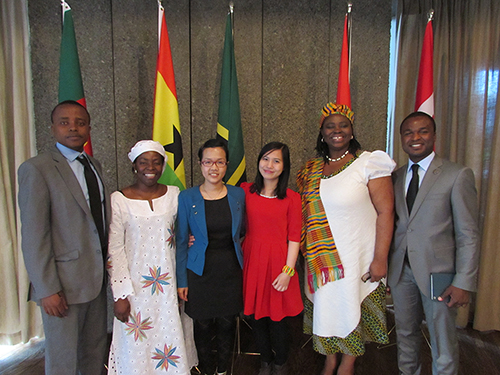Since our founding in 1980, we have delivered capacity building for supreme audit institutions (SAIs) in developing countries through our international programming. More than 280 auditors, from more than 50 countries, have graduated as Fellows and hundreds more have participated in our workshops abroad.
The program has always been funded by the Government of Canada and delivered with the strong and continuous participation of our Canadian partners.
The rationale and broad objectives of our international programming have remained consistent over time, but the design of the program has evolved—beginning with only Fellowship placements in Canada, then expanding to include workshops abroad, and now providing even more in-depth support.
2018-2025: The International Governance, Accountability and Performance (IGAP) Program
In this program, we worked with four countries—Guyana, Rwanda, Senegal, and Vietnam—over seven years, developing strong partnerships and delivering a variety of capacity-building activities. We continued to deliver the Fellowships and courses for which CAAF is known, while also expanding our course offerings and introducing new training formats to best meet the needs of the participating SAIs and oversight committees.
Developments during this seven-year program included:
- Introduction of virtual training and a hybrid Fellowship format: When the COVID-19 pandemic prevented travel, CAAF adapted its audit courses to offer training through an interactive virtual classroom platform and launched online self-paced courses for oversight committees. We also adjusted the Fellowships to include a virtual component that participants complete in their home countries before coming to Canada. These virtual offerings continue to be a valuable complement to our in-person training.
- Executive overview courses for SAIs’ senior managers: We developed short courses that summarize what auditors learn in the full versions of courses, to help SAI managers consider how new approaches can be applied in their offices.
- Training on auditing gender equality and the United Nations’ Sustainable Development Goals (SDGs): CAAF developed courses on both of these subjects and delivered them for all four participating SAIs. With CAAF’s mentoring, the Fellowship participants considered gender equality and the SDGs within the topics of their audit plan projects.
- Encouraging greater engagement between SAIs and their stakeholders: To support more impactful performance audits, the program helped the SAIs engage with key stakeholders. We developed new courses on Engaging the Auditee and Your Audit Report and the Media, published our Collaborating for Change series of resources to help civil society organizations engage with SAIs, and collaborated with the SAIs of Guyana and Rwanda to hold outreach sessions.
- Supporting gender mainstreaming within the SAIs: Through a Leaders Program on gender mainstreaming, we worked with all four SAIs on advancing equality and fostering women’s empowerment within their offices. The Leaders Program participants learned about key gender equality concepts, conducted a gender assessment of their office and developed a gender mainstreaming strategy and action plan.
Under the IGAP program, 37 Fellows graduated, we delivered over 150 audit courses to more than 2,500 participants, and more than 300 oversight committee members and support staff participated in workshops.
Read this article to see more highlights and results from the program, and watch the video to hear partners from each SAI speak about the program’s results for their office.
2012-2017: The International Legislative Oversight Program (ILOP)

The ILOP was our first program to focus exclusively on four countries. In this program, we worked with Cameroon, Ghana, Tanzania, and Vietnam, continuing the relationships we had already established with these SAIs. While maintaining the structure of our previous program, with Fellowships held in Canada and training and mentoring delivered abroad, the ILOP provided more in-depth support to these four countries. This included:
- More direct involvement in audits: In the Fellowships, each participant worked with Canadian mentors to plan a performance audit that was to be carried out when they returned home from Canada. As well, several of the in-country training activities were directly connected to the planning, conduct, and reporting of specific audits.
- Increased focus on priority and crosscutting themes: The ILOP required that the Fellows’ audit plan projects address topics related to the Government of Canada’s international development priority themes. We also supported and encouraged audits on the crosscutting development themes of gender equality and environmental sustainability and developed training and guidance materials on these subjects.
- Introduction of Leaders Programs (then called management internships): Training and mentoring for the SAIs was expanded to include the management cadre, addressing topics such as strategic planning, performance measurement, and communications strategies. This added dimension of training reinforced the success of the performance audit capacity building and enabled the SAIs to make a greater impact with their audit reports.
- Greater regional involvement: The program included increased collaboration with INTOSAI regional organizations and other development partners, and a greater emphasis on engaging our partner SAIs in regional and international events. This created additional capacity-building opportunities for the SAIs, extended our reach to the regional level, and ensured that the program avoided duplicative efforts.
Highlights of this five-year program’s results included:
28Fellowsgraduated and planned performance audits on priority themes. |
16SAI Managersparticipated in internships and developed strategic projects, on topics including stakeholder communications, audit topic selection and multi-year planning. |
916Participantsfrom the four SAIs took part in workshops on performance auditing, management and leadership, and working with oversight committees and other stakeholders. |
166Parliamentariansand oversight committee staff participated in workshops to increase their effectiveness. |
60Auditswere planned with the program’s mentoring, of which 40 were completed by the end of the ILOP. |
Read more about this program’s results in our wrap-up article and in the individual country reports for Cameroon, Ghana, Tanzania, and Vietnam.
2007-2012: The International Legislative Audit Assistance Program (ILAAP)

The launch of the ILAAP marked a significant expansion in our international programming. The ILAAP continued the successful Fellowship placements and introduced new components to provide post-graduate support to the Fellows and additional training for SAIs and parliamentary oversight committees.
The key changes were:
- Introduction of in-country activities: We began delivering workshops for the SAIs and parliamentary oversight committees, and mentoring for the SAIs.
- Engagement of more Canadian partners: The Offices of the Auditors General (OAGs) of Alberta and British Columbia began hosting Fellowships, joining the long-time hosts, the OAGs of Canada and Québec. These OAGs, as well as those of Manitoba, New Brunswick, Newfoundland and Labrador, and Nova Scotia, also began to co-facilitate in-country workshops and act as mentors for the SAIs.
- A focus on fewer countries: Whereas our international program previously focused on training individuals, the ILAAP aimed to build a core group of trained performance auditors in selected countries. We therefore narrowed the geographic focus of the program to 11 countries: Barbados, Belize, Benin, Cameroon, Ghana, Guyana, Kenya, Mali, Saint Lucia, Tanzania, and Vietnam.
Under the ILAAP, 39 Fellows graduated and we delivered more than 50 in-country or regional workshops and mentoring sessions, including 10 workshops for parliamentary oversight committees.
1980-2007: The International Fellowship Program
Our international programming began in 1980-81 when four auditors—from Ghana, Malaysia, the Philippines and Singapore—completed a placement at the Office of the Auditor General of Canada. The OAG of Canada continued to host Fellows every year, and soon the OAG of Québec also joined the program.
During this period, 184 Fellows participated, coming from 52 countries. Several of these graduates have gone on to become Auditors General, in countries including Bhutan, Costa Rica, Guyana, Kenya, Nepal, Saint Lucia, Senegal and Sri Lanka, and many others held senior positions in their offices.


